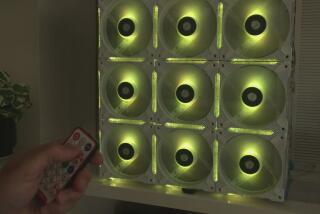Inventor Tries to Clear the Air, One Car at a Time
- Share via
We got a call the other day from a British gentleman named Allan Warren. You know--the inventor of the Hankybreathe.
What? You haven’t heard of the Hankybreathe? Nor had we. Mr. Warren soon filled us in. A society photographer and author, Warren (also an asthmatic) invented the Hankybreathe after the air got so bad near his Kensington abode that he felt as if a foot were being pressed on his chest.
It was either the Hankybreathe or a move to a seaside region that Britons unflatteringly refer to as “Costa Geriatrica.”
Never! vowed Warren.
His solution is a cotton handkerchief with pouches that hold carbon filters to help cleanse the air you breathe. Say you’re sitting in a car--like Warren’s chum Lord Montagu of Beaulieu was when he drove his antique Rolls from Beijing to Paris--and a truck right ahead is spewing soot.
“If you’re young and healthy, you’re going to laugh at it--you’ll sit there and probably smoke cigarettes at the same time,” says Warren. “But if you’re older, getting a bit chesty, you’ll think, ‘Bloody hell, at least I’ve got my Hankybreathe.’ ” Place it genteelly over your mouth and nose, and breathe.
Hankybreathes--sold in fancy shops like Harrods, over the Web and here soon, Warren hopes--come in various hues and patterns: tartan, polka dot, you name it. You can sprinkle eucalyptus oil on them--most refreshing, Warren says--or use them as regular hankies, though they might then get a bit “ucky,” he warns.
“Los Angeles could well do with them,” he says. “You can put them on a dashboard, compare colors at traffic lights--’Oh look, that one’s got a blue one, and I’ve got a red one.’ It could encourage friendliness.” . . . Hmmm.
Mozzarella That Melts and Other Advances
It’s important to keep up with the latest research, we’re sure you agree. Here, then, are a few scientific advances.
* Cornell University food scientists have come up with a way to make healthy low-fat and nonfat mozzarella cheese melt better. The key: a super-thin layer of fat on the outside of the cheese to help all the little pieces of mozzarella fuse together nicely.
* For the first time, scientists have gotten 3D snapshots showing how disease-causing microbes infect human organs like kidneys and bladders, reports the journal Science. Bacteria can’t cling to bladder walls if the bugs are “bald”--they need to make sticky little hairs called pili so they can glom on tight and not be washed away by fluids like urine. The snaps--yikes!--show bacteria making these evil hairs.
* Sufferers of inflammatory bowel conditions (which cause diarrhea, abdominal pain and more) will be interested to know about a new treatment from the University of Iowa: infesting the gut with parasitic worms. (This apparently dampens the immune system, which causes the inflammatory symptoms.) This sounds even uckier than a used Hankybreathe, but then, we’ve never suffered from inflammatory bowel. So who are we to speak?
Leeches and Maggots Get a Better Rep
After reading about the worms, we researched some other medical remedies that use grubs. Such as leeches, used since antiquity for sucking blood out of people. And maggots, for cleaning wounds. Recently, they’ve both made a bit of a comeback.
Leeches, for instance, are being used in delicate surgery, such as reattaching a finger. The little bloodsucker’s saliva contains chemicals that stop blood from clotting, maintaining a healthy supply of blood to tissues. In one case, Boston surgeons used leeches to help save the ear of a 5-year-old after it was bitten off by a dog.
Other doctors, meanwhile, report that maggots--as long as they’re sterile and the right kind--are useful for eating up dead, festering tissue in wounds, allowing the good tissue to better regrow. There was even an international conference on leech and maggot therapy earlier this year.
A quick search on the Web reveals many more interesting tidbits: about a “farm” that has been a purveyor of fine leeches since 1812, leech-transporting containers known as “leech mobile homes,” even a warning to “never reuse a leech and never return a used leech to the pharmacy.” Twice-used leeches can transmit disease. We never thought of that.
More to Read
Sign up for The Wild
We’ll help you find the best places to hike, bike and run, as well as the perfect silent spots for meditation and yoga.
You may occasionally receive promotional content from the Los Angeles Times.






